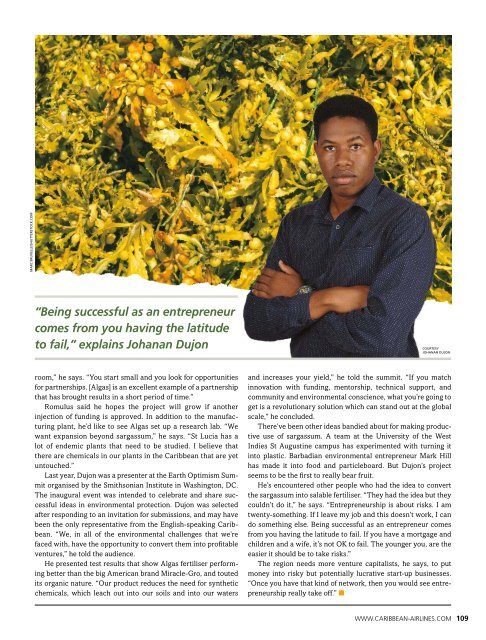Caribbean Beat — January/February 2018 (#149)
A calendar of events; music, film, and book reviews; travel features; people profiles, and much more.
A calendar of events; music, film, and book reviews; travel features; people profiles, and much more.
Create successful ePaper yourself
Turn your PDF publications into a flip-book with our unique Google optimized e-Paper software.
Marc Bruxelle/shutterstock.com<br />
“Being successful as an entrepreneur<br />
comes from you having the latitude<br />
to fail,” explains Johanan Dujon<br />
Courtesy<br />
Johanan Dujon<br />
room,” he says. “You start small and you look for opportunities<br />
for partnerships. [Algas] is an excellent example of a partnership<br />
that has brought results in a short period of time.”<br />
Romulus said he hopes the project will grow if another<br />
injection of funding is approved. In addition to the manufacturing<br />
plant, he’d like to see Algas set up a research lab. “We<br />
want expansion beyond sargassum,” he says. “St Lucia has a<br />
lot of endemic plants that need to be studied. I believe that<br />
there are chemicals in our plants in the <strong>Caribbean</strong> that are yet<br />
untouched.”<br />
Last year, Dujon was a presenter at the Earth Optimism Summit<br />
organised by the Smithsonian Institute in Washington, DC.<br />
The inaugural event was intended to celebrate and share successful<br />
ideas in environmental protection. Dujon was selected<br />
after responding to an invitation for submissions, and may have<br />
been the only representative from the English-speaking <strong>Caribbean</strong>.<br />
“We, in all of the environmental challenges that we’re<br />
faced with, have the opportunity to convert them into profitable<br />
ventures,” he told the audience.<br />
He presented test results that show Algas fertiliser performing<br />
better than the big American brand Miracle-Gro, and touted<br />
its organic nature. “Our product reduces the need for synthetic<br />
chemicals, which leach out into our soils and into our waters<br />
and increases your yield,” he told the summit. “If you match<br />
innovation with funding, mentorship, technical support, and<br />
community and environmental conscience, what you’re going to<br />
get is a revolutionary solution which can stand out at the global<br />
scale,” he concluded.<br />
There’ve been other ideas bandied about for making productive<br />
use of sargassum. A team at the University of the West<br />
Indies St Augustine campus has experimented with turning it<br />
into plastic. Barbadian environmental entrepreneur Mark Hill<br />
has made it into food and particleboard. But Dujon’s project<br />
seems to be the first to really bear fruit.<br />
He’s encountered other people who had the idea to convert<br />
the sargassum into salable fertiliser. “They had the idea but they<br />
couldn’t do it,” he says. “Entrepreneurship is about risks. I am<br />
twenty-something. If I leave my job and this doesn’t work, I can<br />
do something else. Being successful as an entrepreneur comes<br />
from you having the latitude to fail. If you have a mortgage and<br />
children and a wife, it’s not OK to fail. The younger you, are the<br />
easier it should be to take risks.”<br />
The region needs more venture capitalists, he says, to put<br />
money into risky but potentially lucrative start-up businesses.<br />
“Once you have that kind of network, then you would see entrepreneurship<br />
really take off.” n<br />
WWW.CARIBBEAN-AIRLINES.COM 109


















